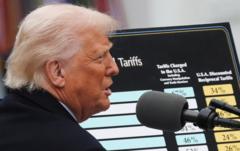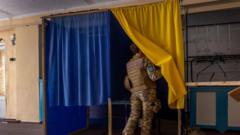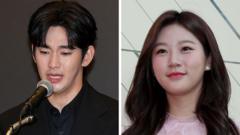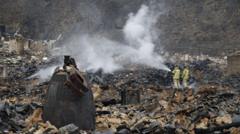With President Yoon's impeachment upheld by the Constitutional Court, South Korea is poised for a snap election by June 3, as citizens grapple with the implications of this dramatic political upheaval.
South Korea's Presidential Crisis: Aftermath of Yoon Suk Yeol's Impeachment
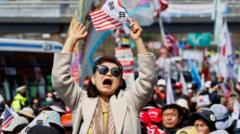
South Korea's Presidential Crisis: Aftermath of Yoon Suk Yeol's Impeachment
South Korea faces a crucial turning point following the Constitutional Court's unanimous decision to remove President Yoon Suk Yeol from office, marking a significant chapter in the nation’s political landscape.
Yoon's presidency came to an abrupt end when a unanimous vote by the Constitutional Court affirmed his impeachment, stemming from a controversial martial law declaration on December 3 that lasted only six hours. The decision was celebrated by some South Koreans while leaving many others with deep fears about the future.
The court, criticizing Yoon's actions as an authoritarian power grab, noted that instating martial law violated citizen rights and damaged the principles of democracy. Moon Hyung-bae, the act's head judge, stated that Yoon's actions were unjustified and were a betrayal of the public trust. This ruling spurred relief among citizens, who rejoiced in the streets of Seoul, reflecting a collective sigh after months of anxiety over Yoon’s aggressive governance.
However, Yoon's departure has exacerbated existing divisions within South Korea, which has seen drastic polarization over the past few months. Many South Koreans initially united against the president’s brazen attempt of military intervention, yet as he clung to power, Yoon’s rhetoric galvanized support from a growing faction that perceives him as a victim of corrupt political elites.
Contrastingly, a significant portion of the populace is skeptical of the established judiciary and political processes, fostering an environment of distrust that underpins the urgency for forthcoming elections. The looming shake-up forces the country into a crucial election cycle under the specter of conspiracy theories gaining traction, which paint the political landscape as riddled with foreign infiltrators. The discontent of those who feel disenfranchised by the political elite remains palpable, as thousands of supporters mobilize weekly in protests against perceived injustices.
South Korea's next president must navigate a divided nation while managing domestic and international challenges. The economy faces looming threats from U.S. tariffs, and the geopolitical landscape is fraught as relations with North Korea and the United States hinge on the next leader's strategies.
Calls for constitutional reform also emerge as citizens contemplate reforms to prevent future consolidations of power by the president, emphasizing the necessity of a balanced governance system. While Yoon’s party, the People Power Party, has accepted the court's ruling, Yoon’s continued defiance suggests that the political tension may not subside quickly.
The coming weeks are pivotal as South Korea approaches its next election, marked by a climate of dissent and uncertainty, compelling political representatives to seek avenues for unity and progress amidst ongoing challenges. As the nation prepares to elect a new leader, the experience underscores the vital importance of resilient democratic principles amid a turbulent political backdrop.
The court, criticizing Yoon's actions as an authoritarian power grab, noted that instating martial law violated citizen rights and damaged the principles of democracy. Moon Hyung-bae, the act's head judge, stated that Yoon's actions were unjustified and were a betrayal of the public trust. This ruling spurred relief among citizens, who rejoiced in the streets of Seoul, reflecting a collective sigh after months of anxiety over Yoon’s aggressive governance.
However, Yoon's departure has exacerbated existing divisions within South Korea, which has seen drastic polarization over the past few months. Many South Koreans initially united against the president’s brazen attempt of military intervention, yet as he clung to power, Yoon’s rhetoric galvanized support from a growing faction that perceives him as a victim of corrupt political elites.
Contrastingly, a significant portion of the populace is skeptical of the established judiciary and political processes, fostering an environment of distrust that underpins the urgency for forthcoming elections. The looming shake-up forces the country into a crucial election cycle under the specter of conspiracy theories gaining traction, which paint the political landscape as riddled with foreign infiltrators. The discontent of those who feel disenfranchised by the political elite remains palpable, as thousands of supporters mobilize weekly in protests against perceived injustices.
South Korea's next president must navigate a divided nation while managing domestic and international challenges. The economy faces looming threats from U.S. tariffs, and the geopolitical landscape is fraught as relations with North Korea and the United States hinge on the next leader's strategies.
Calls for constitutional reform also emerge as citizens contemplate reforms to prevent future consolidations of power by the president, emphasizing the necessity of a balanced governance system. While Yoon’s party, the People Power Party, has accepted the court's ruling, Yoon’s continued defiance suggests that the political tension may not subside quickly.
The coming weeks are pivotal as South Korea approaches its next election, marked by a climate of dissent and uncertainty, compelling political representatives to seek avenues for unity and progress amidst ongoing challenges. As the nation prepares to elect a new leader, the experience underscores the vital importance of resilient democratic principles amid a turbulent political backdrop.








